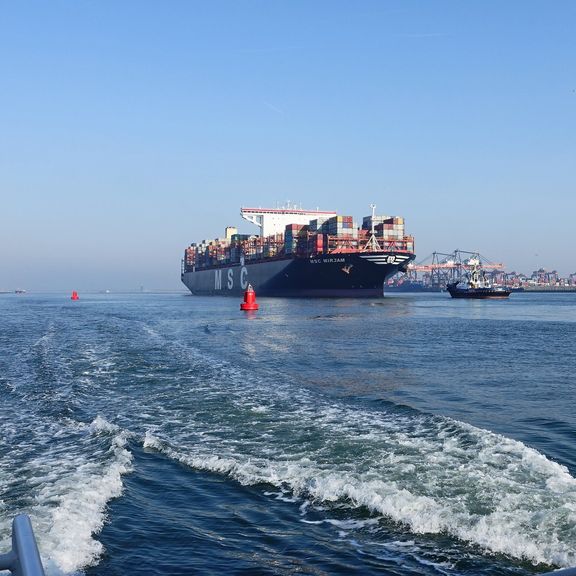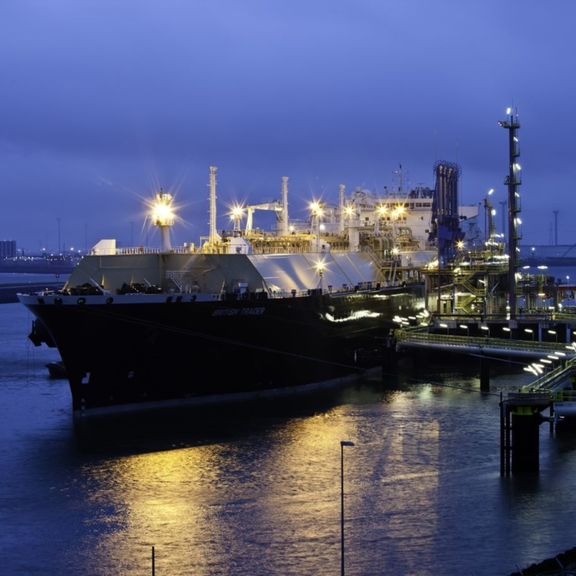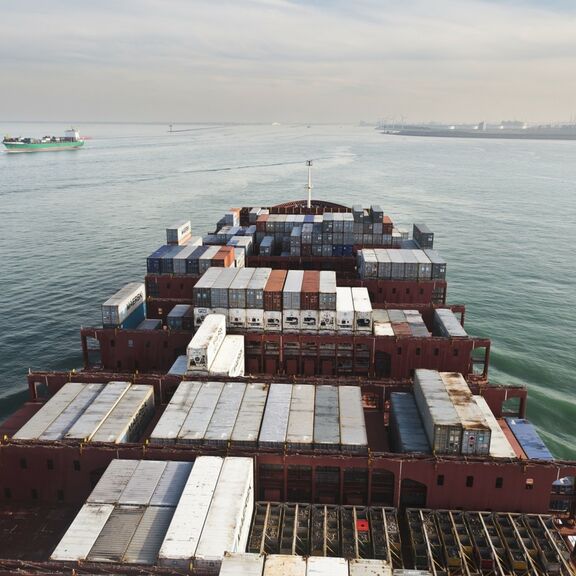
Seaport dues
Are you visiting the port of Rotterdam with a seagoing vessel? Then you will need to pay the Port of Rotterdam Authority seaport dues. In the port of Rotterdam, the amount of the seaport dues is determined by the use you make of the port, the gross tonnage of the vessel and the quantity of transhipment.
A sustainability component is being added based on the size of a vessel. Sustainability and efficiency are gaining a more significant role in calculating the seaport dues.
Port tariffs
The Port tariffs of the seaport dues are established annually by mutual agreement between the Port of Rotterdam Authority and the parties involved. The Port tariffs and the conditions in the port of Rotterdam are listed in the General Terms and Conditions of the Port of Rotterdam Authority. Rates for maritime service providers and waste levy are also included in the General Terms and Conditions. To check the current pilotage dues, please consult the website of Loodswezen.
Declaring seaport dues
Via IAMConnected you can declare seaport dues, buoy and dolphin dues and waste charges here. The web portal will ask you to finish a pre-filled form to complete your declaration. This service is free of charge for agents and shipping companies.
Discounts on seaport dues
Many seagoing vessels are eligible for discounts on the seaport dues. For example, the Port Authority offers discounts to sustainable vessels and seagoing vessels that visit the port of Rotterdam regularly.
Frequently asked questions seaport dues
Why have the agreements between Deltalinqs, the Association of Rotterdam Shipbrokers and Agents (VRC), the Port of Rotterdam Authority been adopted for three years?
We agreed a period of three years to offer the segment stability and continuity. There will be an evaluation each year (September) between Deltalinqs, Association of Rotterdam Shipbrokers and Agents and the Port of Rotterdam Authority to discuss the impact of the changes.
What is the indexation of the port tariffs for 2025?
The indexation of the port tariffs amounts to 6 per cent for 2025. This amounts to 3.5 for 2026 and 2.5 per cent in 2027.
What are the most specific changes to the seaport duties?
• Seaport dues will be compiled of three components from 1 January 2025: vessel, load and a sustainability component. A sustainability component is being added to place the focus on sustainability.
• Commodities related to fuels and the energy and raw materials transition are being added. The first step in this is adding scrap and renewable oil products as new product groups alongside the existing commodities. A positive price differentiation will be applied to the new product groups.
• Existing discount schemes (2nd call, transhipment, volume and agricultural bulk discounts) from the current port tariffs booklet are being abolished.
• Discount schemes aimed at sustainability and efficiency are being upgraded. This regards three discounts:
o The turning point for most commodities is applied to the load component. The better a vessel’s load factor, the lower the price per transhipped tonne. The turning point ensures that once the turning point has been reached, the remaining tonnages will be transhipped at a zero tariff.
o The Environmental Ship Index (ESI) discount will be applied to the sustainability component following a scale. This means that the higher your ESI score, the greater the discount received on the sustainability component.
o Green Award discount will be applied to the sustainability component.
• Some special tariffs are being abolished or upgraded.
o The 80/20 rule is being abolished to simplify the calculation of the seaport dues.
o A sustainable bunker-only rate is being upgraded to encourage sustainable bunker calls in the port of Rotterdam. The current bunker-only rate will remain.
The above changes are being implemented to stimulate sustainability and efficiency. Furthermore, the tariff structure is being simplified. The changes are in line with the Port of Rotterdam Authority’s ambitions. The changes are explained in more detail below.
Addition of a sustainability component.
Starting from 1 January 2025, seaport dues will be compiled of three components: a vessel, load and sustainability component.
• The vessel component depends on the type and size of the vessel.
• The load component depends on the type of cargo and quantity of transhipped tonnes.
• The sustainability component depends on the type and size of the vessel.
The seaport dues were always calculated based on the vessel size and type, and quantity of throughput. Those calculations are now being established differently: the emphasis is not only on the vessel and load components, but a sustainability component is also being added. Specifically, that means that the more sustainable a vessel is, whereby it emits fewer hazardous emissions, the relatively lower the port dues will be.
How is the load component being viewed?
The focus on the energy, raw materials and fuel transition ensures additional attention to specific goods. These goods will be added to the types of cargo in the long term. This is for awareness, as a price stimulus and for monitoring.
This applies to commodities in dry and liquid bulk. The additional commodities provide greater insight into transhipment.
• Agencies will be able to choose from an additional product group under dry bulk, namely ‘Scrap’.
• Agencies will be able to choose from an additional product group under liquid bulk, namely ‘Renewable oil products and chemicals.’ This applies to the commodities: Biodiesel/FAME, Renewable Diesel/HVO, Ethanol, ETBE, Renewable Aviation Fuel, Renewable Naphtha.
What role does a vessel’s load factor play in determining the seaport tariff?
The load factor will count in the seaport tariff. The better utilised a vessels’ capacity is, the more efficient the port call is, and the fewer port calls required. That has a positive effect on reducing CO2 emissions per tonne.
The discount scheme applies above a certain ‘turning point’ for transhipment. Shipments which are loaded and/or unloaded or are transhipped more than average will benefit from this. It ensures the remaining tonnages are charged at a zero tariff.
What impact does sustainability have on the level of seaport dues?
The sustainability component means you pay for being present in the port area through the sustainability component. This means a more sustainable vessel pays less than a less sustainable vessel.
Basically, with every visit, a sustainability component will be charged as well as the vessel and load components. This can be reduced through two schemes:
1. When a vessel has a high score on the Environmental Ship Index (ESI), the total seaport dues could be lower for the shipping company.
The ESI discount is calculated based on the ESI score. The higher the ESI score, the higher the discount.
2. If a vessel has a Green Award certificate.
The Green Award discount is calculated based on whether the vessel has a Green Award certificate.
Specifically, this means the more sustainable a vessel is and the fewer hazardous emissions it releases, the lower the seaport dues will be in relative terms. Based on this component, a visit could be fully exempt or receive money for this. That will then be deducted from the vessel/load component.
The total payable seaport dues can never be under 0.
What does the Environmental Ship Index (ESI) entail?
The Environmental Ship Index (ESI) is an international standard for sea-going vessel emissions. Vessels that have a high ESI score receive a discount on the seaport dues. This enables us to reward sustainable sea-going vessels in the port of Rotterdam.
You can find more information on the Environmental Ship Index discount on seaport dues.
When is my vessel eligible for a Green Award discount?
The independent agency Green Award Foundation awards the Green Award certificate to vessels and shipping companies that have made additional investments in the vessel and crew to improve the safety and environmental performances. The Port of Rotterdam Authority rewards vessels possessing a Green Award certificate with discounts on the seaport dues. The level of the discount depends on the type of certificate the vessel has.
You can see how you can obtain a green Award certificate on Green Award Foundation.
Will the existing discounts still apply?
No. As of 1 January 2025, several existing discounts on seaport dues are being abolished.
These are the volume, agricultural bulk, transhipment and second port call discounts.
This is to simplify the structure of the seaport dues.
The abolition of the discounts will be processed in the new basic tariffs.
When will the new Port Tariffs booklet be issued?
The new Port Tariffs booklet with the general terms and conditions will be issued and made available in December.
General Privacy Statement
Pursuant to the Amendment Decree of 13 November 2018 regarding Table II of the Turnover Tax Act 1968, the Port Authority of Rotterdam, or our customers, has a fiscal obligation to provide proof with respect to the application of the zero VAT rate on seaport duties. This burden of proof is so burdensome that PoR wants to unburden you, as a skipper, from this task. In concrete terms, this means that we will use your AIS data on legal grounds to fulfil the burden of proof. The Port Authority will of course handle these data very carefully. Although this is not personal data, you can consult our procedure for questions regarding the rights of data subjects.


